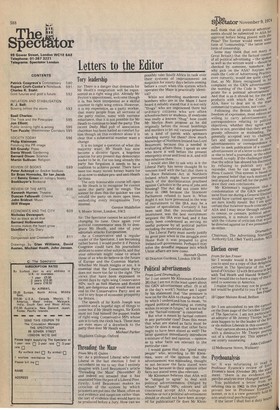Political advertisements
From Lord Drurnalbyn
Sir: I can assure Mr Kleinman (October 26) that I am not in the least upset about the GKN advertisement affair. (It is all in the day's work!) Neither am I upset by his statement that the pressure is now on for the ASA to change its brief"; by which 1 understand him to mean, "to regard political advertising as coming within its scope in future," at least so far as the "factual content" is concerned. But what is meant by factual content in any particular case? Does this mean that what are stated as facts must be facts? Or does it mean that other facts ought to have been stated as well? The latter question immediately introduces a mixture of fact and opinion — opinion as to what facts are relevant to the particular case.
I would guess that the "good many people" who, according to Mr Kleinman, were of the opinion that the advertisement was misleading, thought so not, because the facts stated were false but because in their opinion other facts not stated were also relevant.
Mr Kleinman believes that ASA will. be "obliged to agree" to deal with political advertisements. Obliged by whom? Would MPs, editors and all concerned accept ASA rulings on whether or not a political advertisement should or should not have been accepted for publication? Or does Mr Klein
ma; think that all political advertisements should be submitted to ASA for approval before being placed with the Press? The former would mean some form of "censureship," the latter some
form of censorship.
Some may think (but not many in Great Britain) that the factual content of all political advertising — the spoken as well as the written word — should be checked by someone, somehow. But why pick on the ASA? Anyone wh° reads the Code of Advertising Practice, even cursorily, would see quite clearly that, as Mr Rifles recognised in his complaint on the GKN advertisement, the wording of the Code is "inaPPr°priate for a political advertisemene; And that is as it should be; for the erluA products with which the Code, ari,",, ASA, have to deal are in the irle'" commercial transactions, not votes. , Following the British tradition 0. freedom of expression, most editors are willing to carry advertisements, roi correspondence relating to politca objectives, whether they agree with, them or not, provided that they are no! grossly offensive or misleading. Tile generally accepted way to challeng! fact and opinion contained in sun!' advertisements or correspondence is either to seek publication of a counter advertisement or of a letter to the editor, or else to brief a journalist, or the editor himself, to reply. If the challenger thishs that the editor has abused his discretioho by refusing to publish any rejoinder, then he can appeal to Press Council. Council. This system is based on the general belief that such matters are best argued out and left for the public t0
draw their own conclusions.
Mr Kleinman's suggestion that a condemnation of the GKN advertise' ment from me during a General Election would have carried special weight, is., am sure, kindly meant. But I am 401,1 certain that however much criticism ASA and I may incur through refusios to censor, or censure, political ad" r. tisements, it is minute in comParisolici with the volume of criticism that WO.°to be directed against Lis if we presume do either. DrurnaihY° Chairman, The Advertising Stand5rd2s Authority Ltd, 1 Bell Yard London, WC


































 Previous page
Previous page